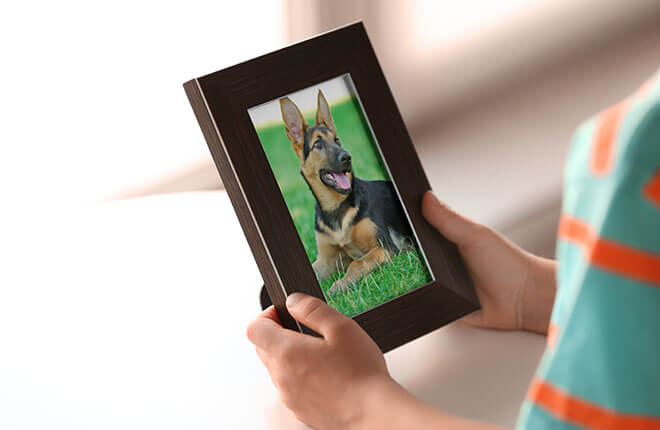Pets are considered family members by many. They provide us with unconditional love even when we think we don’t deserve it. They make us laugh when we thought we didn’t have anything to laugh about. They wrap their paws around our hearts and give them a jiggle.
It’s no wonder that the loss of a beloved pet can trigger emotional pain. Whether you’ve recently lost a pet or you’re thinking about how you’ll handle this challenging event in the future, it helps to have an idea of what to expect and coping mechanisms in place to manage your emotions. Understanding this process can also help you provide support to friends and family who find themselves grieving the loss of a pet.
What to Expect After A Pet Passes Away — The Grieving Process
You must allow yourself to grieve the loss of your pet. There’s no exact formula for processing what you’re feeling. Most people are familiar with the five stages of grief: denial, anger, depression, bargaining, and acceptance. You may find that the stages overlap one another, occur in a different order, or that you do not experience all five stages.
Your pet was a part of your everyday life, and the schedule and habits you developed together may continue to impact you even after they’re gone. You may find yourself grabbing a ball for a morning game of toss, only to find that your dog isn’t there to retrieve it. You’ll swear you heard the “feed me” meow from your old gray tabby, but when you look, there’s no one there. These experiences are not uncommon. After all, it takes time to adjust.
Depending on the circumstances of your pet’s death, and particularly if you had to decide to let them go, you might be dealing with feelings of guilt. Some people wrestle with the final days of their pet’s life, while others reflect on how they could have been a better pet parent. Don’t worry — this is also completely normal. These feelings will come and go, often at unexpected times, but should slowly fade as you move through your grief.
While you're grieving the loss of a pet, you'll have good days and bad. Although it may not feel possible right now, you will reach the stage of acceptance. There may be a tinge of sadness that lasts a lifetime, but you’ll find that life goes on and that moving on does not diminish the love and life you shared with your pet.
Coping With the Loss of A Pet
There are many ways to cope with the loss of your pet and a multitude of resources available. Choose what’s best for you. And remember, you’re not alone.
In Your Home
Seeing reminders of your pet may lead to an emotional response, be it joy or sadness. If you become flooded with memories that overwhelm you, you might want to store items like collars, toys, and beds that belonged to your pet. You can go back to them in the future when you’re in a better emotional state.
If the idea of solemnly packing these things away is upsetting, consider making it one small part of a larger cleaning and organizing project. Move through your home, rearranging and adjusting your environment to support this change you’re experiencing without all of the focus being on packing up your pet’s belongings.
Memorializing Your Pet
Many people receive comfort by memorializing their pet as a way of preserving their memory. This can take on various forms. Below are just a few ideas:
- Have a paw print of your pet made in clay.
- Take a small clipping of your pet’s fur.
- Make a collage of your favorite pictures.
- Have a memorial service.
- Plant a tree or other plant in your pet’s honor.
- Display a special item from your pet (collar, favorite toy, lock of hair) in a window box frame with a photo.
- Create an artistic memorial from your pet’s ashes.
- Spread their ashes in a special place and mark it with a decorative stepping stone.
- If buried on private property, place a distinct headstone in this area in remembrance.
- Express your feelings in the written word. This can be in the form of a poem, short story, or social media post, whatever form works for you.
- Make a donation to an animal welfare organization in your pet’s name.
- Explore ways to help other animals in their memory, like fostering, volunteering at a rescue, or helping with local stray/lost pet programs.
Talk About Your Loss
Sharing your grief with others who are going through the same loss, or talking to someone who empathizes with your loss, may help build you up and feel less alone. Consider friends, family, and support groups. Some people benefit from speaking with a grief counselor to work through the emotions of loss.
Explore Websites that Focus on Pet Loss
There are websites dedicated to pet loss and associated grieving. They offer a variety of resources to help you get through this difficult time or provide comfort to others experiencing loss.
Reading
The written word can provide comfort for many. Much has been written about pet loss.
Helping Others Cope with The Loss of A Pet
Watching someone you care for losing a pet can be difficult — but you can provide a tremendous amount of support to help them through it.
- Be there when they need to talk. Maybe talking about good times with their pet will bring a smile (or they may feel better with a bit of distraction). Don’t be afraid to ask what it is that they need.
- Validate their feelings. During periods of heightened emotion, it can be helpful to have someone simply say, “Yes, I can understand why you feel that way. It’s to be expected. I’d be going through the same thing in this situation.”
- Try not to pry. After a painful goodbye, some people want to share the details. Others may not want to relive those moments. Let your friend know you’re there to listen if they want to talk about it — but be careful not to push them into a conversation they don’t want to have.
- Respect their decisions and beliefs. This may not be the time to debate how a pet lived their final moments or what happens beyond this life. You may not share the same views on these topics. Just be there for support.
- Give a gift. A thoughtful gift can be a nice way to lift someone’s spirits, whether it’s a memorial gift like some of the ideas mentioned above or just a happy little something-or-other that brings joy.
ZPC-01494R1

.jpg)

